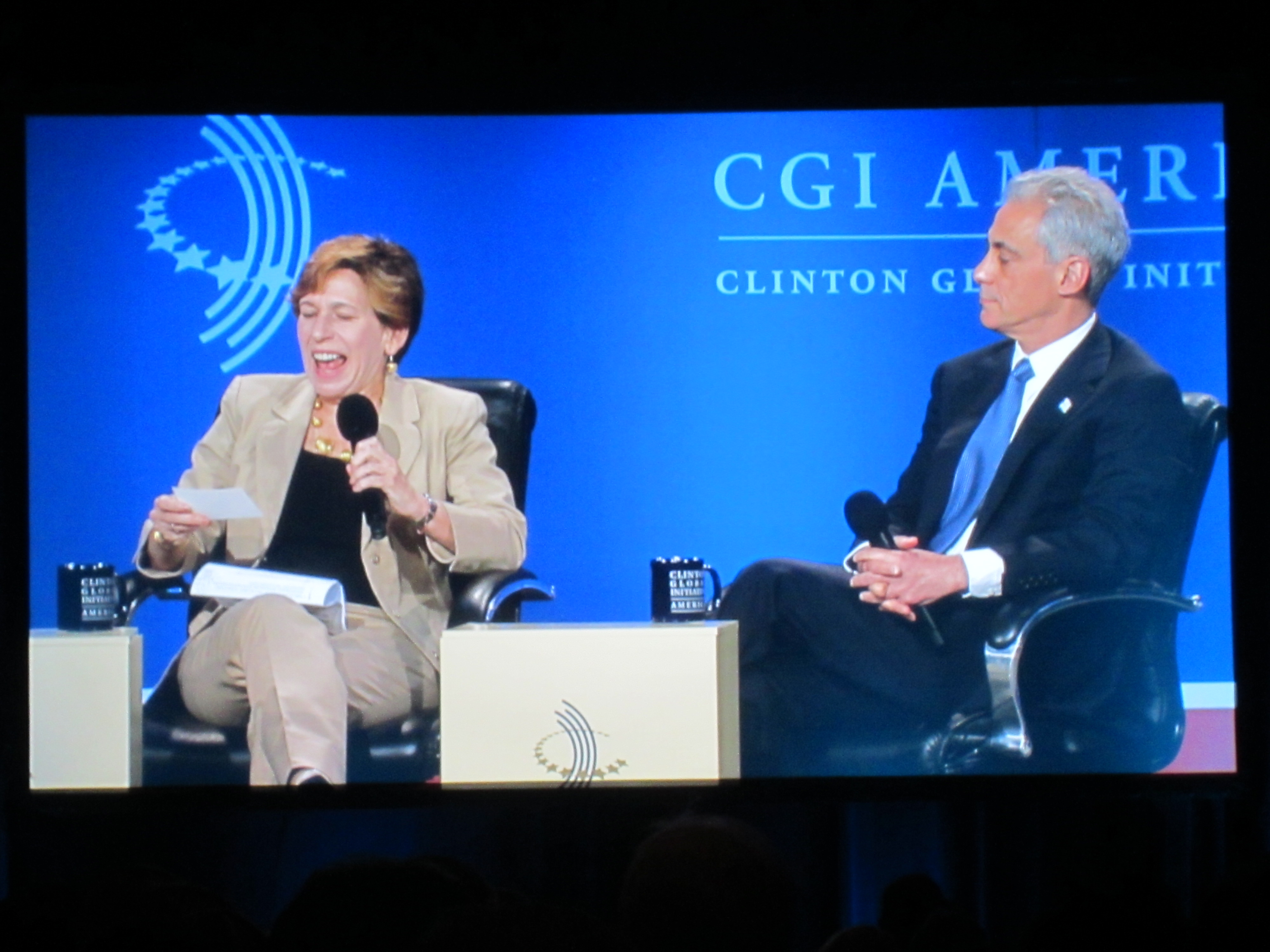Strike for America: Chicago Teachers Against Austarity
by Micah Uetricht
Verso 2014

Introduction (pages 1 - 3)
On June 7, 2012 there were two visions of teacher unionism on display in Chicago one could be found in a hotel overlooking the Chicago River rubbing shoulders with the city’s and the world's elites downtown; the other in public schools throughout the city.
Randi Weingarten, president of the American Federation of teachers (AFT), had flown into Chicago to speak at the Clinton Global Initiative, an annual event held by former President Bill Clinton’s foundation. She was to sit on a two-person panel, moderated by militant centrist Fareed Zakaryia, to discuss the recently announced Chicago Infrastructure Trust, an infrastructure development program that allows corporations to invest in and profit from financing of public infrastructure projects for things like sewers, roads, and water lines. Her copanelist was mayor Rahm Emanuel.
Weingarten sat next to the mayor, politely chuckling at jokes made by a man who had declared war on public school teachers and all but announced his intentions to disassemble public education in the city of Chicago. She praised Emanual’s public-private partnerships and infrastructure development, making no mention of his plans to dramatically expand Chicago's charter schools–a public-private partnership par excellance–intended to slip the free market’s foot in the door of public education before completely privatizing it. Nor did she speak of the months during which the mayor antagonized the city's education workforce, his attempts to recind contractually obligated raises for the teachers, or the major battle teachers were locked into with the mayor over the future of public education in the city.
At precisely the same time, Chicago teachers were in their schools–not teaching, but voting on whether or not they would strike during their contract negotiations with the mayor. They had no words of praise for Emanuel’s public-private partnership or his vision for education reform in Chicago, which they identified as harmful to both teachers and students. They were rebuking him in the strongest way they could: by voting to strike come the fall. Although school was not in session, 90% of all members of the Chicago teachers union (CTU) and 98% of those voted called for a strike. Teacher’s on vacation or tracked down so that no vote would be lost; one teacher who was hospitalized and undergoing rehabilitation was even met at the hospital by small group of CTU members to help her vote–an act, she explained in a video, that was critically important to her personally.
Weingarten never joined these teachers and never showed her face at a school where the teachers were voting. After speaking alongside Mayor Emanuel, she flew out of Chicago. She would eventually join striking teachers on the picket line, after whatever behind-the-scenes attempts national union staff likely engaged in during the months leading up to the walk-off had failed. But, her belated presents notwithstanding this, the strike, eventually touted as one of the most important labor victories in recent American history, with authorized almost without any acknowledgments from the president of the AFT.
In many ways, the contrast between the events at the high-rise hotel and the crumbing neighborhood schools was indicative of the choice the teachers unions, and organized labor as a whole, face in the 21st century. Would they continue to opt for an insider strategy, praising the neoliberal politicians and titans of capital who wanted to destroy them, and I hope that perhaps, if they were sufficiently deferential, these force with spare them and their members? Or would they confront those enemies and their ideologies head-on, with militant tactics like strikes and deep organizing within communities?
The extreme inequality in America's public school system has been both willfully ignored and a cause célèbre for crusading activists and wealthy philanthropist throughout the country's history. Today the trend favors philanthropists, we generally believe that the way to reform education is to privatize it. Education, once seen as a sacrosanct public institution, has become another public good to be dismantled and handed over to the marketplace. In some cities this has meant the institution of voucher programs, which allow parents to take the children out of public schools, and roll them in private schools, and still receive public money to cover tuition. Elsewhere, public schools have been shattered and teachers laid off. Nearly everywhere, teachers have been identified as the culprits behind school supposed poor performance.